Peritoneal Dialysis in Gorakhpur – Expert Kidney Care by Dr. Arpit Srivastava
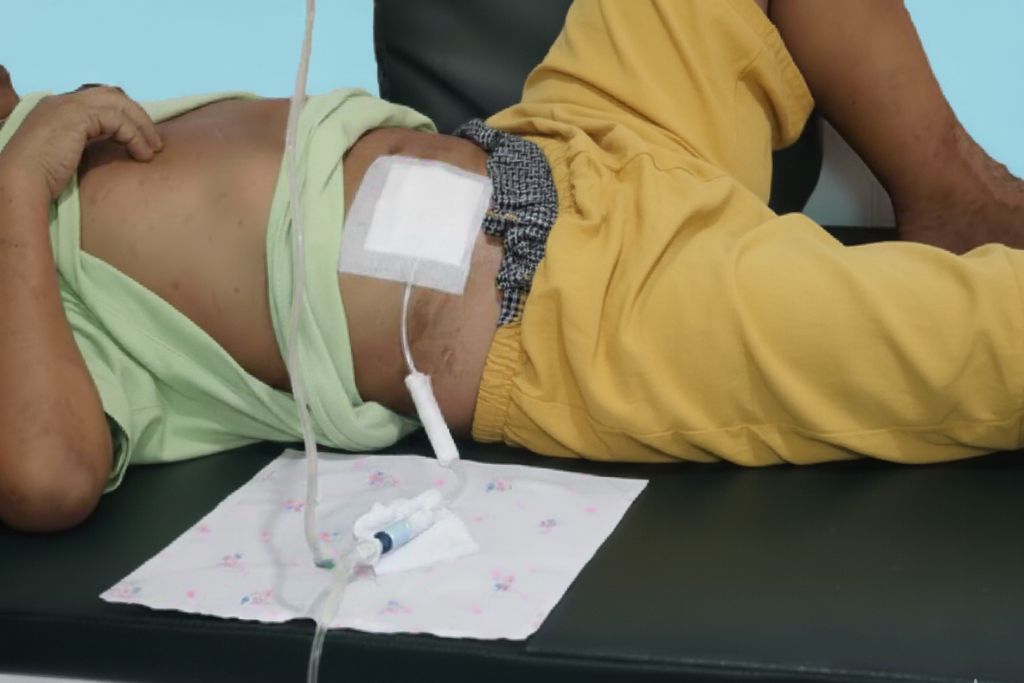
What is Peritoneal Dialysis?
Kidney failure is a life-altering condition that requires timely and effective treatment to maintain health and quality of life. Dialysis plays a critical role in managing patients with chronic kidney disease (CKD) and End Stage Renal Disease (ESRD). Among the different dialysis options, peritoneal dialysis in Gorakhpur offers a flexible and patient-friendly alternative, allowing individuals to manage their condition safely at home under expert guidance.
Dr. Arpit Srivastava, a leading kidney specialist in Gorakhpur, provides comprehensive peritoneal dialysis services. With advanced expertise and compassionate care, he ensures patients receive personalized treatment plans that fit their lifestyle while maintaining optimal kidney function.
+91-7054357996Types of Peritoneal Dialysis
There are two main types of peritoneal dialysis available at expert centers in Gorakhpur:
Dr. Arpit Srivastava customizes the type of peritoneal dialysis based on patient needs, medical condition, and lifestyle, ensuring the best outcomes for kidney health.
Continuous Ambulatory Peritoneal Dialysis (CAPD)
CAPD is a manual method in which the patient performs multiple exchanges of dialysate throughout the day, typically 4–5 times. It does not require a machine and allows patients to maintain a normal daily routine. CAPD is ideal for patients who are active and wish to avoid frequent hospital visits.
Automated Peritoneal Dialysis (APD)
APD is performed using a specialized cycler machine, usually overnight while the patient sleeps. The machine automates the fluid exchanges, making it convenient for patients who prefer minimal daytime interruptions. APD is particularly suitable for working professionals and individuals who require more structured dialysis schedules.
Enquiry Now
Quick and easy online scheduling
+91-7054357996 arpitnephro@yahoo.comProviding advanced kidney care at Regency Hospital, Gorakhpur
Who Needs Peritoneal Dialysis?
Peritoneal dialysis is recommended for patients with moderate to severe kidney failure who require regular dialysis. The following groups may benefit:
- End Stage Renal Disease (ESRD) patients seeking home-based treatment.
- Chronic Kidney Disease (CKD) patients with declining kidney function.
- Patients with difficulty accessing vascular systems for hemodialysis.
- Individuals desiring more flexibility and independence in dialysis scheduling.
Before starting peritoneal dialysis, Dr. Arpit Srivastava conducts a comprehensive evaluation to ensure the patient is medically suitable for this therapy. This includes reviewing kidney function, medical history, and lifestyle considerations.
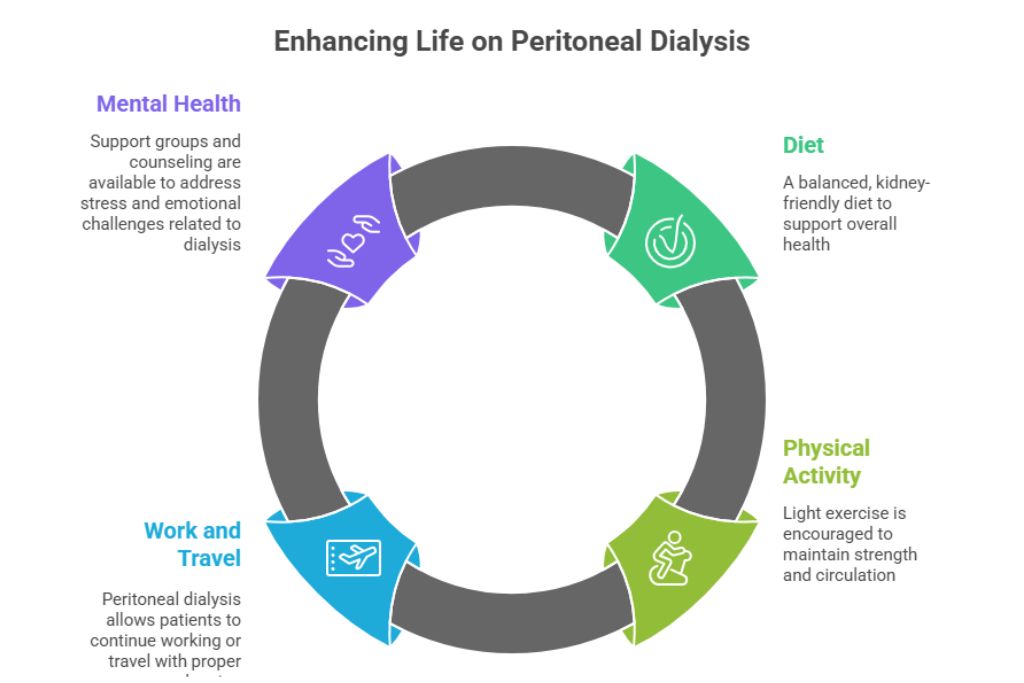
Benefits of Peritoneal Dialysis
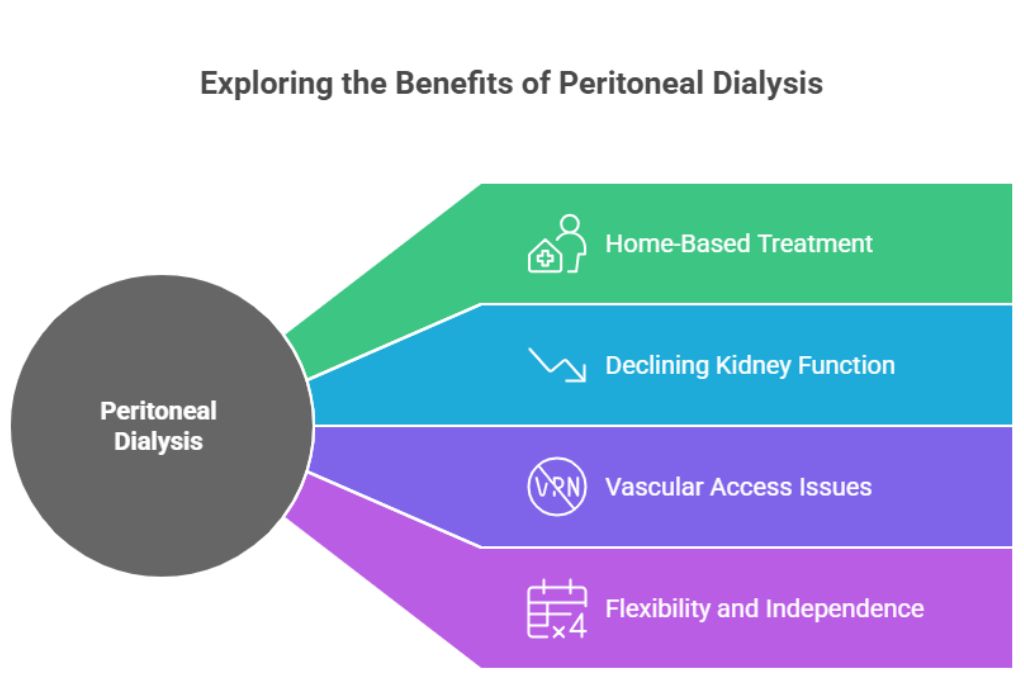
Peritoneal dialysis offers several advantages over traditional hemodialysis:
- Convenience and Flexibility: Patients can perform dialysis at home, eliminating frequent hospital visits.
- Continuous Toxin Removal: Continuous dialysis leads to more stable blood pressure and fewer fluctuations in fluid levels.
- Preservation of Kidney Function: Residual kidney function is better maintained compared to hemodialysis.
- Reduced Dietary Restrictions: Patients have greater flexibility in diet, allowing better quality of life.
- Lower Risk of Vascular Complications: No repeated needle insertions are required, reducing vascular stress and infection risk.
These benefits make peritoneal dialysis in Gorakhpur a preferred option for many patients seeking a more independent and manageable dialysis routine.
The Peritoneal Dialysis Procedure
Catheter Insertion
A small, flexible catheter is surgically placed in the abdominal cavity to allow dialysate to enter and exit. This procedure is performed under sterile conditions to prevent infection and usually takes 30–60 minutes. Dr. Arpit Srivastava ensures that the catheter is placed with precision and minimal discomfort to the patient.
Dialysis Exchange
Once the catheter is in place, the patient can begin dialysis. During each exchange:
- Dialysate is infused into the abdominal cavity.
- It dwells for several hours, absorbing waste and excess fluid.
- The fluid is then drained and replaced with fresh dialysate.
The number of exchanges per day and the volume of dialysate are tailored based on individual needs and the type of peritoneal dialysis chosen.
Training and Home Management
Patients and caregivers receive detailed training on performing dialysis exchanges safely at home. This includes:
- Maintaining sterility and hygiene
- Monitoring fluid balance
- Recognizing signs of infection or complications
- Managing supplies and equipment
Dr. Arpit Srivastava provides ongoing support and guidance to ensure patients can manage peritoneal dialysis confidently and safely at home.
Preparation for Peritoneal Dialysis
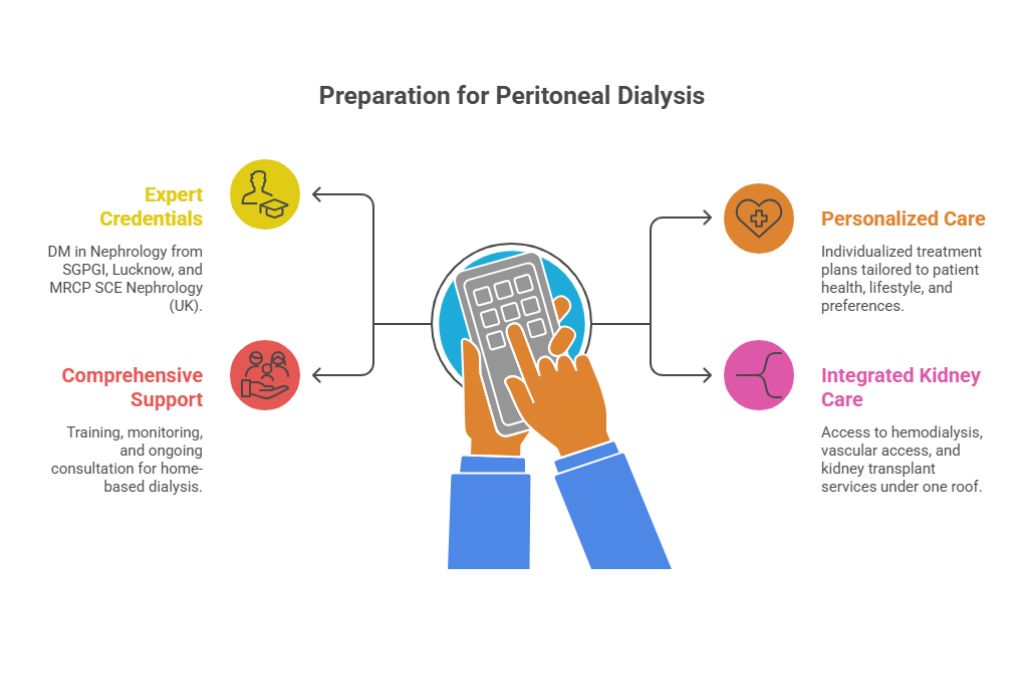
Patients across Gorakhpur trust Dr. Arpit Srivastava for peritoneal dialysis due to his:
- Expert Credentials: DM in Nephrology from SGPGI, Lucknow, and MRCP SCE Nephrology (UK).
- Personalized Care: Individualized treatment plans tailored to patient health, lifestyle, and preferences.
- Comprehensive Support: Training, monitoring, and ongoing consultation for home-based dialysis.
- Integrated Kidney Care: Access to hemodialysis, vascular access, and kidney transplant services under one roof.
By choosing Dr. Arpit Srivastava, patients receive expert guidance and compassionate care, ensuring safe and effective management of kidney failure.
Home Care and Maintenance
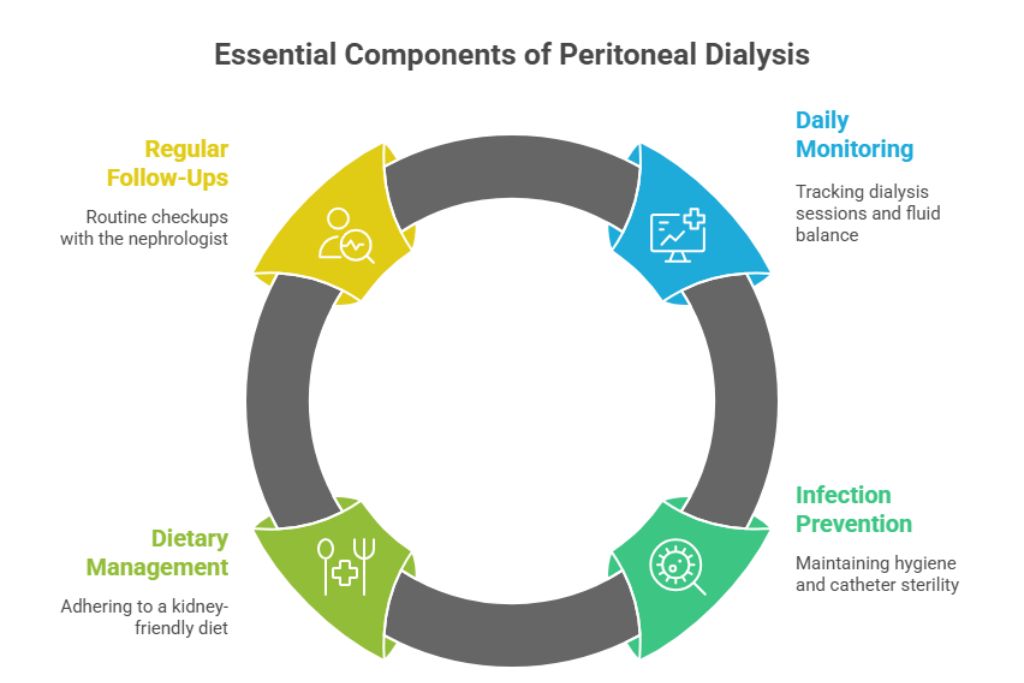
Successful peritoneal dialysis relies heavily on proper home care. Key aspects include:
- Daily Monitoring: Tracking dialysis sessions, fluid intake, and urine output.
- Infection Prevention: Following strict hand hygiene and maintaining catheter sterility.
- Dietary Management: Adhering to a kidney-friendly diet with controlled sodium, potassium, and fluid intake.
- Regular Follow-Ups: Routine checkups with the nephrologist to monitor catheter function and overall health.
By adhering to these practices, patients can achieve excellent outcomes while maintaining independence and a good quality of life.
Risks and Precautions
While peritoneal dialysis is generally safe, there are some potential risks:
- Peritonitis: Infection of the abdominal cavity, preventable with proper hygiene.
- Catheter Complications: Blockage, migration, or leakage.
- Hernias or Fluid Imbalance: Occasionally caused by repeated fluid exchanges.
- Metabolic Issues: Electrolyte imbalances or blood sugar fluctuations in diabetic patients.
Dr. Arpit Srivastava emphasizes early detection and management of complications. Patients are educated to recognize warning signs, such as fever, abdominal pain, or cloudy dialysate, and to seek immediate medical attention if these occur.
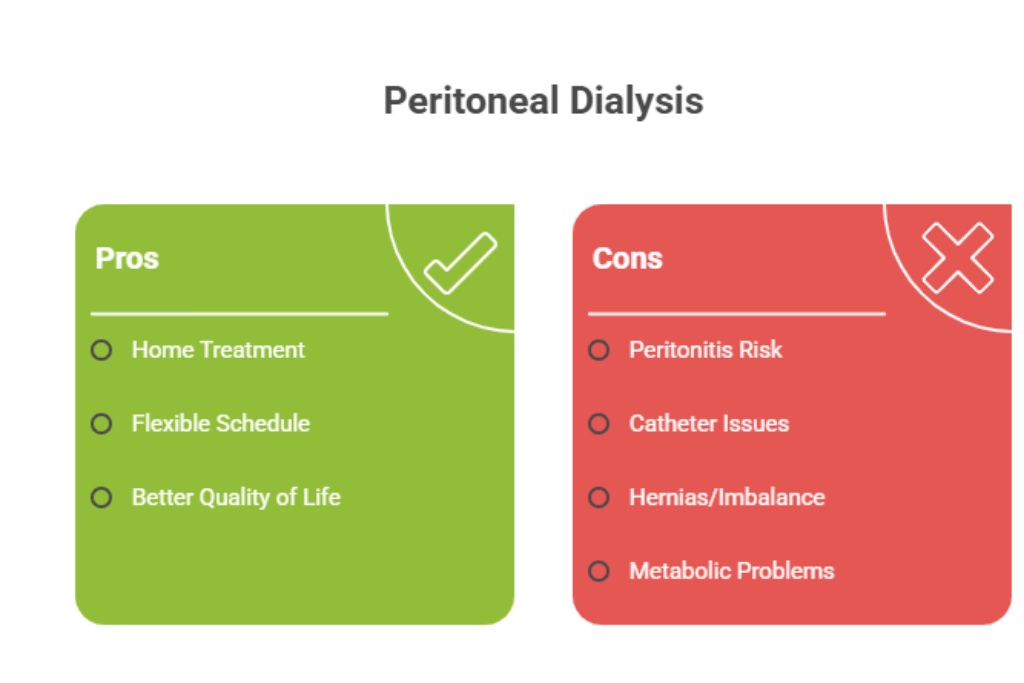
Lifestyle Considerations
.jpg)
Patients on peritoneal dialysis can lead active and fulfilling lives. Lifestyle considerations include:
- Diet: A balanced, kidney-friendly diet to support overall health.
- Physical Activity: Light exercise is encouraged to maintain strength and circulation.
- Work and Travel: Peritoneal dialysis allows patients to continue working or travel with proper planning.
- Mental Health: Support groups and counseling are available to address stress and emotional challenges related to dialysis.
Dr. Arpit Srivastava provides comprehensive guidance on maintaining a healthy lifestyle while managing kidney disease with peritoneal dialysis.
Why Choose Dr. Arpit Srivastava for Peritoneal Dialysis in Gorakhpur?
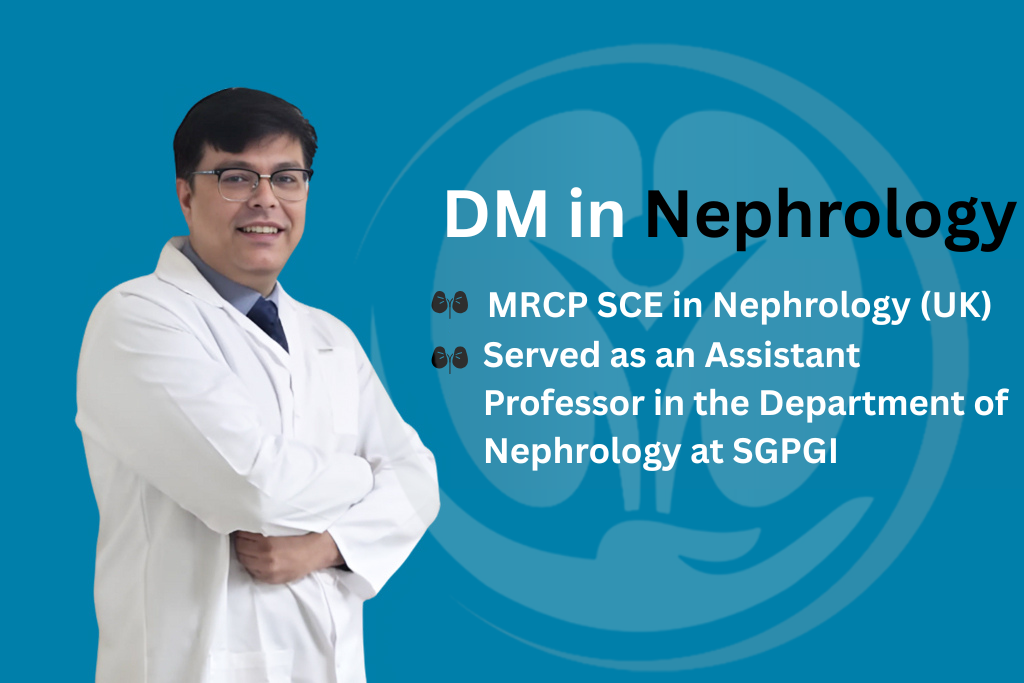
Patients across Gorakhpur trust Dr. Arpit Srivastava for peritoneal dialysis due to his:
- Expert Credentials: DM in Nephrology from SGPGI, Lucknow, and MRCP SCE Nephrology (UK).
- Personalized Care: Individualized treatment plans tailored to patient health, lifestyle, and preferences.
- Comprehensive Support: Training, monitoring, and ongoing consultation for home-based dialysis.
- Integrated Kidney Care: Access to hemodialysis, vascular access, and kidney transplant services under one roof.
By choosing Dr. Arpit Srivastava, patients receive expert guidance and compassionate care, ensuring safe and effective management of kidney failure.
FAQs – Kidney Specialist & Kidney Doctor in Gorakhpur
Contact Us for Peritoneal Dialysis in Gorakhpur
For safe, reliable, and patient-centered peritoneal dialysis in Gorakhpur, trust Dr. Arpit Srivastava. Our team offers comprehensive training, ongoing monitoring, and expert guidance to help you manage kidney failure effectively at home or in the clinic.
Callout: Take control of your kidney health with expert peritoneal dialysis in Gorakhpur. Schedule your consultation today for personalized care and continuous support.
Is peritoneal dialysis safe?
Yes. With proper training, hygiene, and regular follow-up, peritoneal dialysis is a safe and effective treatment for kidney failure.
Can I continue working while on peritoneal dialysis?
Yes. Many patients maintain their professional and personal routines, especially with automated peritoneal dialysis (APD) performed overnight.
How long does each dialysis session take?
CAPD exchanges usually take 30–40 minutes each, performed 4–5 times per day. APD is automated overnight, typically taking 8–10 hours.
What are the signs of infection or complications?
Cloudy dialysate, abdominal pain, fever, or redness at the catheter site should be reported immediately.
Can peritoneal dialysis replace hemodialysis permanently?
For many patients, peritoneal dialysis can be the primary dialysis method, provided it is suitable for their medical condition and lifestyle.
Let's Connect
Room no 19, Second Floor, Regency Hospital, Plot No-623, Medical College Road, Gulhariya, Gorakhpur, Uttar Pradesh 273013
Hours:
- ● Monday: 10 am – 5 pm
- ● Tuesday: 10 am – 5 pm
- ● Wednesday: 10 am – 5 pm
- ● Thursday: 10 am – 5 pm
- ● Friday: 10 am – 5 pm
- ● Saturday: 10 am – 5 pm
- ● Sunday: Closed
Help Is Here—Call Now!
Immediate support is just a call away. Reach out now and let us take care of the rest.



.png)